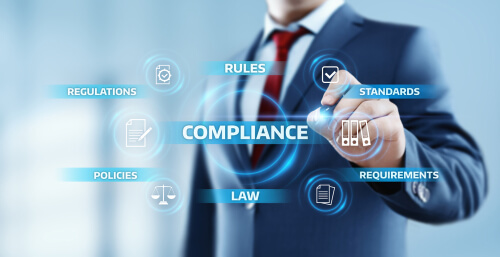
Maintaining HR compliance is vital. If you don't keep up with it, you risk heavy fees, penalties, and potential employee lawsuits. Unfortunately, the rules change all the time. You may also have to deal with varied and complicated rules if you have employees or job sites in multiple states or occasionally in multiple townships or counties.
That can make compliance a full-time job, but most small businesses can't afford to hire a compliance officer. So, what things do businesses need to do to maintain compliance?
How to Maintain HR Compliance
HR compliance is very complicated and requires a significant amount of attention. Here are the best things you can do to help you stay compliant:
Stay Educated About Regulation Changes
You need to stay up to date on all changes to federal, state, and local regulations regarding payroll and HR. That means paying attention to existing policies and keeping an eye on existing and proposed changes.
Many changes give a grace period before you must comply, so you do have some time to catch up. It's also important to educate yourself on changes that might result from developments within your company. Perhaps you have hired a remote worker in a new-to-you state and need to check the rules that apply to them. Or you have hit 50 or 100 employees and become covered by new regulations.
All of this has to be kept up with and tracked by HR.
Setup Internal Policies
Your internal HR compliance policies must be consistent, clear, and firmly grounded in the regulations. Having everything in writing can help you hold people accountable and reduce the number of mistakes. It's also a good idea to set up onboarding processes that ensure that all of the paperwork is done correctly and signed off on, which is often best done with high-quality software.
Ensure that your internal policies are current and that everyone can easily access them, ideally in multiple formats.
Train Employees According to Regulations
Ensure all your employees receive training in the regulations that apply to them. That primarily refers to HR staff and includes anyone who might have to touch anything HR-related.
For example, anyone conducting interviews needs to be trained on illegal and potentially biased questions to know what not to ask a candidate. Anyone who handles employee information in any way, even collecting emails for invites to happy hour, must know the privacy rules surrounding that information.
It can be tempting to keep your employees from knowing their rights, but often companies benefit from the opposite.
Seek Expert Counsel
As mentioned, a full-time compliance officer is beyond the resources of most small businesses. Yet, regularly checking in with HR experts can help you avoid high compliance costs.
That is particularly the case if you are dealing with multiple state regulations. Partnering with a professional employer organization (PEO) is the best way to access this expertise. When you partner with a PEO, you get their experience, expertise, and access to an entire compliance team when and as you need it. They will also have the expertise you need to improve onboarding and training and can save you money by keeping funds in your company.
Keep Accurate Records
You need to keep completely accurate employee information records, including contracts, benefits, payroll, and performance reviews.
Accurate records can help you defend yourself from allegations if you have a potential compliance issue. They can also help you fix a problem quickly by detecting its source. For example, if you have a payroll error, you can track it down and fix it, making the employee less likely to file a complaint or lawsuit against you.
An accurate record of performance reviews can help if an employee makes complaints or accusations regarding promotions or bonuses.
That is another thing a PEO can handle for you, and take it off your plate. They have access to enterprise-grade human resources information systems (HRIS) software that can handle records easily, keep them centralized, and make them easy for the person who needs to retrieve them, especially if they are at a remote location.
Grow Your Business by Staying Compliant
Compliance is vital. Failure costs small businesses millions of dollars a year. Partnering with a PEO can help you deal with compliance. As they take over routine HR duties, they will handle and be responsible for many things that can cause compliance issues, such as payroll and benefits administration.
Partner with a PEO so you don't have to worry about HR compliance and can always stay on top of it.

